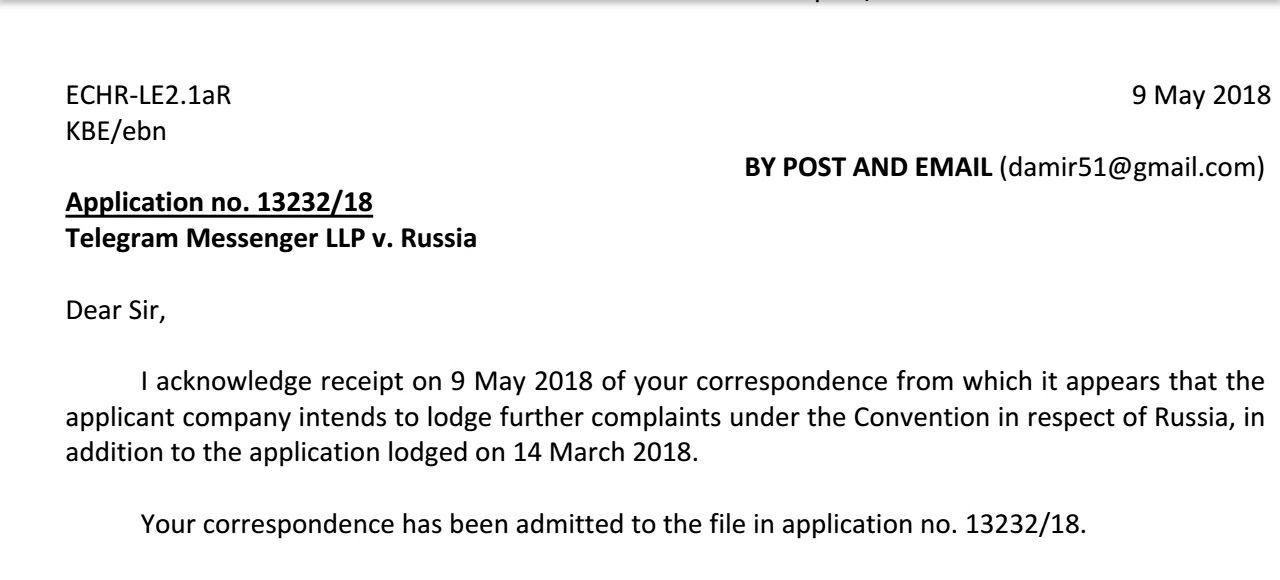The Telegram v. Russia case will be considered by the European Court of Human Rights. Also sent a complaint to the Moscow City Court

A month ago, on April 13, 2018, the Tagansky Court of Moscow, after a 19-minute trial, satisfied the requirements of Roskomnadzor to block the Telegram messenger . This historic decision triggered a chain of events during which thousands of companies and ordinary users suffered. In an attempt to comply with the court decision, Roskomnadzor blocked up to 20 million IP addresses (now there are 10.99 million IP addresses left in the registry).
Telegram is represented by the law firm “Agora”, whose head Pavel Chikov has recently become a Telegram star - 17,760 subscribers, more than on many entertainment channels.
')
Yesterday and today, Paul reported two good news. First, the European Court of Human Rights registered a Telegram complaint against a fine of 800,000 rubles. for refusing to provide the FSB with encryption keys. In addition, the court was notified of the court decision authorizing the blocking of Telegram - and offered to file a full complaint on this matter in a separate form. According to the lawyers of Agora, this suggests that the ECtHR is in principle ready to consider this case, because at the registration stage most of the complaints to Strasbourg are now being rejected.
Secondly, on May 11, 2018, an appeal to the Moscow City Court was sent to the decision of the Tagansky Court of Moscow ( text ).
The complaint states four “gross violations of procedural law”, which the lower instance court allowed, according to the lawyers of Agora:
- the application was submitted by an unauthorized person (neither the federal legislator nor the Government of the Russian Federation authorized Roskomnadzor to apply to the courts),
- the application was improperly considered as a special procedure (in this case there was no dispute about the fact),
- the court violated the adversarial principle and the company's right to defense (the trial took 19 minutes and passed without the participation of a company representative),
- the court avoided checking and assessing the legality and necessity (proportionality) of restrictions imposed on the company (mandatory judicial control).
It is difficult to be surprised at such a flagrant violation by the Tagansky court, given that lawyers of this court had previously been convicted of ignorance of the civil process : “It’s no secret that the Moscow courts do not have sufficient knowledge of substantive and procedural law. But to demonstrate publicly one’s own lack of professionalism means to make the legal community laugh. The Tagansky Court succeeded, ”commented Pavel Chikov.
“In addition, the measures taken by Roskomnadzor to restrict access to Telegram, led to the fact that from April 16, 2018 to the present, telecom operators blocked up to 20 million IP addresses, millions remain blocked even now,” said appeal. - Most of the blocked addresses are owned by international Internet companies, including Google, Amazon, Digital Ocean and Microsoft. This massive blocking of IP addresses has had a detrimental effect on a wide range of Internet services that have nothing to do with Telegram. Dozens of enterprises suffered and continue to incur losses ... When deciding to block, the Tagansky District Court of Moscow had to take into account the various interests affected and the negative effect that the Telegram service could have (and ultimately had) for the formal reason for the company's failure to fulfill the FSB requirements. ”
Based on the listed violations, the representatives of the plaintiff ask to cancel the decision of the Tagansky District Court of Moscow of April 13, 2018 in case No. 2-1779 / 18, in accordance with Part 5 of Article 330 of the Code of Civil Procedure of the Russian Federation, consider the case according to the rules of procedure in the court of first instance, accept the decision provided for by paragraph 3 of Article 328 of the Code of Civil Procedure of the Russian Federation (discontinue the proceedings).
Despite possible gross violations of procedural legislation, the chances of the Moscow City Court canceling the Tagansky court’s decision do not look one hundred percent. Probably, an objective consideration of the issue by the European Court of Human Rights is more likely. Its jurisdiction extends to all Council of Europe member states that have ratified the European Convention for the Protection of Human Rights and Fundamental Freedoms, including Russia. The decision made by the ECHR is mandatory for the respondent state in the case. A significant part of court decisions of the ECHR are not in favor of the Russian authorities. For example, in February 2017, the court awarded Russian activist Alexei Navalny compensation in the total amount of 63,678 euros for seven detentions during the 2012-2014 rallies.
Source: https://habr.com/ru/post/358536/
All Articles